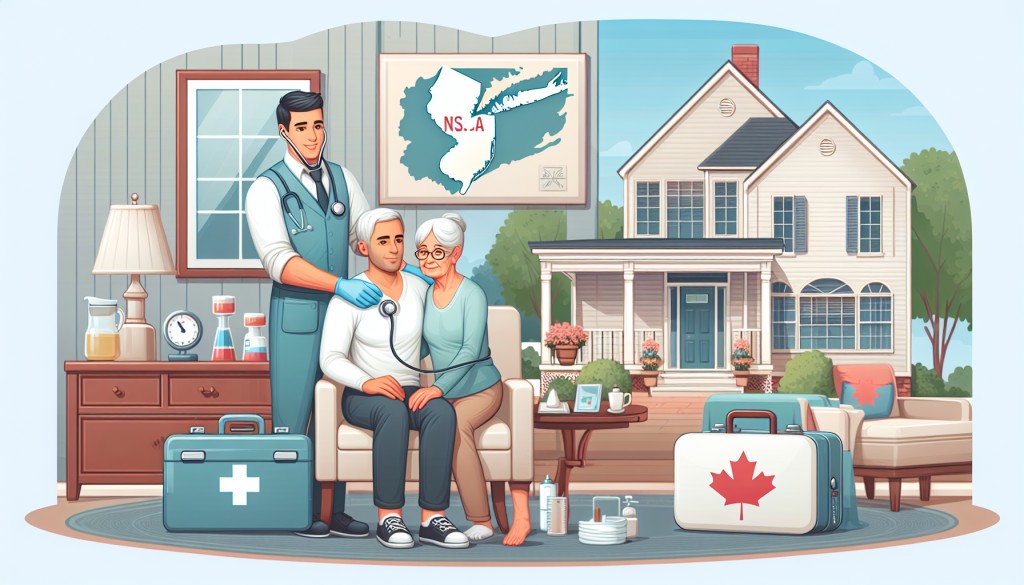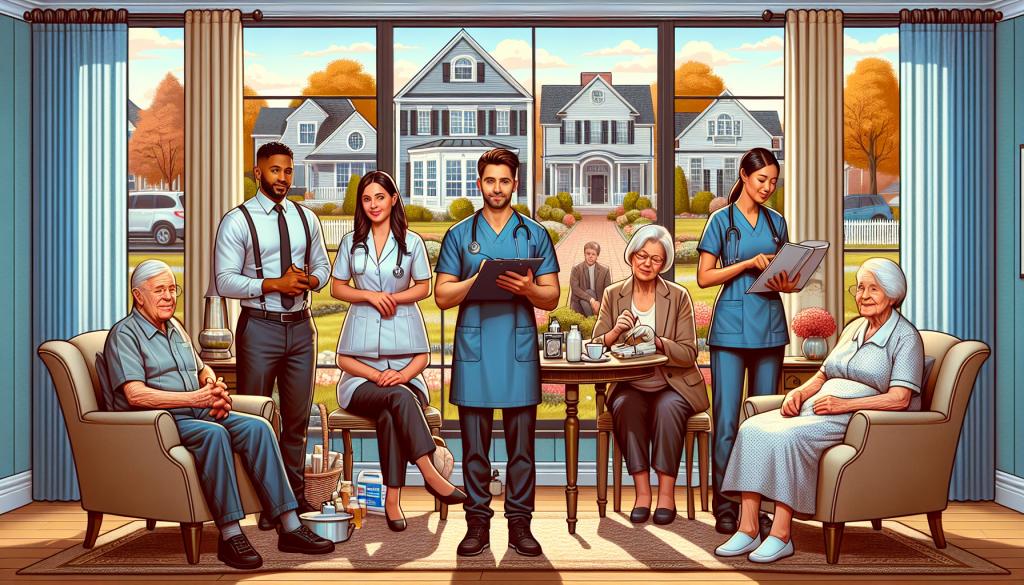Validate Licensing, Accreditation, and High Quality Rankings
Before you sign with any home doctor in 2025, deal with licensing, certification, and quality ratings as non‑negotiables. Austin's Best Home Health Providers: 2025 List . Start with the essentials: confirm the agency is correctly accredited in your state for the precise solutions you need. "Home wellness" (competent nursing, treatment, wound care) is managed differently from "home treatment" or "individual treatment" (showering, clothing, companionship). Utilize your state wellness department or expert licensing board's online data source to verify the firm permit is energetic and in great standing, and that it covers the appropriate service classification. If the firm will certainly bill Medicare, validate it is Medicare‑certified; you can cross‑check this on Medicare's Care Compare website.
Accreditation isn't the like a permit, but it signifies the agency has actually fulfilled higher standards and goes through normal external evaluation. Seek valued approving bodies such as The Joint Commission, CHAP, or ACHC. Request a current certification certification and the date of the last study. For non‑medical home care, certification is voluntary; if a company isn't accredited, they need to be able to explain exactly how they maintain quality and oversight in its absence.
Do a much deeper credential check on the people who will be in your home. Registered nurses, accredited nurses, physical and physical therapists, and social workers all have private licenses you can validate with state boards. Home wellness assistants should fulfill state training needs. It's practical to ask the company to validate that all staff have actually passed background checks, are not on the government OIG Exemptions Provide, and carry suitable expert responsibility and workers' compensation coverage. Request proof of the agency's general obligation insurance policy; numerous family members likewise request for a certificate of insurance coverage upon contracting.
Use unbiased high quality scores to contrast agencies, not just testimonies. On Medicare Care Contrast, evaluate the star scores and dig into certain measures like timely initiation of treatment, rehospitalization rates, renovation in movement and self‑care, and individual experience scores from HHCAHPS surveys. In 2025, Home Wellness Value‑Based Buying applies nationwide, so ask the company to share its most recent efficiency or outcome records and what it is doing to improve. For Medicaid home- and community‑based services, inspect your state's service provider directory site for high quality signs, important occurrence reports, and EVV (electronic see verification) compliance information. On the internet testimonials can be helpful but must not bypass official top quality data and regulatory records.
Demand transparency. Ask the company for its most recent state study outcomes and plan of improvement, any kind of CMS assents or charges, and how problems are dealt with. In an era of telehealth and remote monitoring, ask about device safety and security and privacy techniques, HIPAA compliance, and whether any digital tools they use are FDA‑cleared where appropriate. If the agency asserts hospital or medical professional collaborations, validate how they share info, specifically if they integrate with your medical professional's document system.
Red flags include evasive answers concerning licensing or study history, ran out certification, missing proof of insurance, abnormally high team turn over without explanation, or top quality scores well below local averages. A trustworthy company will certainly invite these inquiries, supply documents quickly, and assist you interpret ratings in the context of your needs. Confirming credentials and quality up front requires time, yet it is the most dependable means to safeguard safe, effective care in the house.

Analyze Telehealth, Remote Monitoring, and Data Security
Assess Telehealth, Remote Surveillance, and Data Security
In 2025, picking a home healthcare provider means looking past bedside skills to the digital backbone that supports your treatment. Telehealth, remote person tracking, and data safety now figure out just how practical, risk-free, and linked your care will be.
Beginning with telehealth. Video clip check outs should really feel as reliable as an office consultation. Ask just how easy it is to schedule, whether you can see the same clinician for continuity, and what takes place if the link drops. Try to find features like e-prescribing, secure messaging, after-visit recaps, and language accessibility such as interpreters or inscriptions. Confirm the system services your gadgets, sustains accessibility needs, and provides technology assistance for elders or caretakers. Equally as important is combination: does the telehealth platform talk to your existing medical documents so your primary care medical professional sees updates? If care crosses state lines, validate licensure and whether your insurance provider covers the services you plan to make use of.
Remote monitoring can change every day life for people handling persistent problems, recovering after surgical procedure, or needing safety and security checks. Focus on medical worth and operational dependability. Which problems do they check and with what gadgets? Are the devices FDA-cleared and confirmed for home use? Who enjoys the information, just how often, and what are the response times for irregular analyses during the night or on weekend breaks? Ask how alert thresholds are set to restrict false alarms and just how usually those thresholds are reviewed. Inspect whether gadgets are loaned or acquired, who takes care of configuration, training, and replacement, and what cellular or Wi‑Fi connectivity is called for. Interoperability still matters below as well: will your data circulation right into your health document, and can you see it in a patient application?

Data safety and security ought to never be a second thought. A company's case of "HIPAA certified" is a baseline, not a differentiator. Seek independent audits or accreditations (for example, SOC 2 Kind II, HITRUST, or ISO 27001), encryption of data in transit and at rest, multi-factor verification, and role-based gain access to with audit logs. Inquire about incident action and violation notification treatments, just how commonly they run protection drills, and their method to ransomware resilience and backups. For home tools, validate that information is encrypted on the device and during transmission, software is maintained to date, and lost or swiped equipment can be remotely cleaned. Clarify that possesses your data, for how long it's maintained, exactly how to request deletion, and whether de-identified information is utilized for analytics or shown to third parties. Make sure an Organization Associate Agreement exists between the innovation vendors and the care company, and that frontline staff are learnt privacy practices, consisting of acquiring authorization for any kind of recording.
Lastly, consider the human side of the innovation. Will they assist set up your Wi‑Fi or supply cellular kits if you don't have broadband? Do they provide clear directions, large-print products, multilingual assistance, and caretaker training? Exists 24/7 tech assistance and a simple way to escalate professional issues?
In an industry crowded with applications and devices, the most effective home healthcare services in 2025 blend high-quality medical care with reliable virtual accessibility, workable tracking, and rigorous protection of your info. Select the team that clarifies their technology clearly, verifies their safeguards, and makes it easy for you and your household to utilize.
Assess Treatment Plans, Staffing, and Caretaker Fit
Selecting home healthcare in 2025 methods looking past a shiny sales brochure. The best partner will certainly reveal you a clear treatment strategy, trustworthy staffing, and a caregiver that genuinely fits your liked one's requirements and personality. Beginning with the treatment plan. Ask how the agency analyzes demands and collections goals: not just detects, however practical capacities, medicines, fall threat, cognitive support, nourishment, solitude, transportation, and caregiver respite. A strong plan is composed by or under the guidance of a signed up nurse or specialist, with quantifiable results (as an example, less drops, improved wheelchair, medication adherence) and a timetable for testimonial-- frequently every 30 to 60 days or after any type of adjustment in problem. In 2025, many firms utilize remote patient monitoring and telehealth; see to it the plan discusses what devices are used, that examines the information, and exactly how details is shown your medical professional. Interoperability and privacy matter-- ask whether their systems connect to your physician's electronic records, exactly how information is secured, and that can see updates.

Staffing is where guarantees fulfill truth. Clarify whether caregivers are W‑2 workers or 1099 professionals; staff members usually have more powerful oversight, training, and insurance policy coverage. Confirm qualifications (CNA, HHA, LVN/LPN, REGISTERED NURSE), history checks, driving records if transportation is consisted of, booster shots, CPR, and any kind of specialty training like dementia or Parkinson's care. Request their turn over rate, typical caretaker period, and fill price for changes-- numbers that expose security. Continuity is important: will you have a primary caregiver with a small backup swimming pool, or see constant rotations? What is the back-up prepare for unwell days, no-shows, storms, or public health and wellness alerts? In a tight labor market, firms that pay rather and offer advantages tend to retain team far better-- don't wait to ask how they sustain caretaker well‑being and avoid exhaustion.
Caregiver fit goes beyond accessibility. Share candid information regarding regimens, language preferences, social or spiritual methods, pet comfort, smoking cigarettes level of sensitivities, songs or food choices, and character style. An excellent firm will utilize structured matching-- abilities, language, cultural expertise, sex choice, driving ability, and physical ability for transfers or tools-- to suggest a caretaker and set up a meet‑and‑greet. Numerous will let you try a brief test shift before committing. Observe chemistry: Does the caregiver listen, make eye call, and ask thoughtful inquiries? Do they respect boundaries while being positive? If your liked one has mental deterioration, look for persistence, redirection skills, and a calmness, comforting presence.
Communication must be basic and consistent. Ask to see the household portal or app if one exists: Can you view visit notes, tasks completed, vitals, and messages? Exactly how rapidly does the office respond, and what is the acceleration path after hours? Who is your named care supervisor, and how commonly will they check out face to face to oversee care? In 2025, numerous states need digital see verification-- confirm that clock‑in/ out shields you from payment for missed out on time, which your information is not made use of for anything else without authorization.
Quality and accountability are nonnegotiable. Try to find certification (Joint Commission, MAN, or ACHC) and state licensure. Ask about client complete satisfaction ratings, grievance resolution time, event prices (drops, hospital stays), and any kind of value‑based programs they participate in. Request two current customer references with comparable requirements. Review agreement details carefully: minimal hours, cancellation terms, substitute guarantees, and what happens if the caregiver isn't a fit. If you're making use of Medicare for knowledgeable home health, clarify what is covered and for for how long; for personal task treatment, inquire about long‑term care insurance policy, Medicaid waivers, VA benefits, and whether the agency can help with documentation.
Practical security questions complete the image. Just how do they examine the home for risks and recommend equipment? Do they educate caregivers on secure transfers and infection control? What is the policy on cameras in the home? If the caregiver will drive your loved one, validate insurance coverage and car requirements.
Red flags include vague or cookie‑cutter treatment strategies, no RN oversight, high turn over, constant last‑minute routine changes, reluctance to share outcome data, pushy sales techniques, or resistance to a meet‑and‑greet. Green lights include clear coverage, predictable staffing with backups, respectful matching, and a clear plan for constant renovation.
Ultimately, the appropriate selection feels both professional and personal. You should see a plan you can understand, a group you can get to, and a caregiver your enjoyed one eagerly anticipates seeing. If any item does not feel right, maintain looking-- fit, in home care, is whatever.
Compare Prices, Insurance Policy Protection, and Contract Terms
Contrasting prices, insurance protection, and agreement terms is where most households either conserve thousands-- or encounter undesirable shocks-- when selecting home healthcare solutions in 2025. Treat this like you would any kind of major purchase: need clearness, validate benefits in composing, and check out the small print with a calm, cynical eye.
Beginning with pricing. Ask each provider for an itemized quote that matches your real treatment plan: number of hours each week, level of caretaker (assistant vs. LPN/RN), and any specialized needs such as mental deterioration treatment, wound care, or post-surgical support. In 2025 you'll see a number of designs-- hourly prices, visit-based fees, live-in rates, and packed "hybrid" plans incorporating in-person treatment with telehealth and remote monitoring. Contrast apples to apples by including attachments: minimum-hour demands, overtime thresholds, weekend break and holiday costs, traveling or car park costs, nurse supervision or care management charges, modern technology or device leasing, and charges for immediate scheduling. Ask how commonly rates can change, whether there's a price-lock duration, and if boosts are tied to a fixed percentage or an index. Clarify what occurs when the treatment plan changes mid-month: do they pro-rate or re-quote? If you're taking into consideration a pc registry as opposed to a full-service agency, factor in your responsibility for payroll tax obligations, employees' settlement, and liability-- what looks less expensive upfront can cost much more in danger and administration.
Next, pin down insurance policy coverage. Know the distinction in between medical home wellness (proficient nursing, treatment, typically covered if clinically needed) and non-medical home care (assist with bathing, dishes, and friendship, often not covered by typical health insurance). For Medicare: experienced home wellness can be covered when qualification criteria are fulfilled, but personal treatment is usually not, unless folded up into a plan of treatment. Medicare Benefit plans increasingly supply supplementary at home assistance, dish distribution, or remote tracking-- benefits differ widely by plan, require in-network suppliers, and may require previous authorization or recertification, so verify limitations, copays, and check out caps prior to you start. Medicaid benefits and Home- and Community-Based Providers waivers can be charitable yet differ by state and managed treatment strategy; waiting lists and provider networks matter. Long-lasting care insurance can money substantial hours as soon as benefit triggers are met (typically requiring aid with two or more activities of daily living or cognitive disability), yet view removal periods, day-to-day or regular monthly caps, and lifetime maximums. Experts may receive Help and Participation or Homemaker/Home Wellness Aide services via the VA. Ask if the agency will certainly confirm benefits, take care of consents, and expense straight, and whether they'll proceed treatment if authorizations gap. If you intend to self-pay, ask about discount rates for longer schedules, autopay, or packed programs. HSAs and FSAs can commonly be used for clinically required solutions; for tax obligation reductions or credit scores, consult a tax specialist.
Currently, the contract terms-- the component many people skim and later on regret. Try to find:
- Discontinuation and notice: Can you stop briefly or terminate without penalties? Exist minimums or early termination fees?
- Auto-renewal and rate adjustments: Exactly how are rises interacted and covered?
- Staffing and alternatives: Just how promptly do they replace a caregiver who's sick or not a fit? Is there a trial period or satisfaction assurance?
- Non-solicitation and buy-out: If you wish to employ a caretaker directly later, what charge applies?
- Employee condition and insurance coverage: Are caretakers W-2 employees covered by employees' comp and liability insurance? Request proof.
- Extent of method: What tasks can assistants legally perform in your state (drug management, transfers, catheter treatment)? That oversees and how frequently?
- Paperwork and openness: Will you have access to digital see logs, treatment notes, and reviews? That updates the treatment plan and exactly how regularly?
- Invoicing cycle and conflicts: Deposits, late costs, refunds for extra hours, rounding guidelines for shift start/stop times, and the procedure for contesting a bill.
- Security and personal privacy: Case reporting, infection control, history checks, driving policies, and data privacy for any kind of remote surveillance tools.
- Disagreement resolution: Adjudication conditions, venue, and your rights under state consumer regulations.
Do a straightforward "true cost" contrast throughout finalists: projected once a week hours x price + all anticipated charges-- verified insurance policy repayment. Then layer in non-financial value: responsiveness, back-up coverage, managerial quality, and end result tracking. In 2025, trusted firms can show quality metrics and may join value-based programs-- request their hospitalization reduction prices or customer satisfaction ratings.
Prior to finalizing, obtain every guarantee in creating, including start day, caretaker certifications, and the precise services covered. If the agreement really feels dense or prejudiced, have actually a relied on consultant or attorney review it. The very best offer is not just the lowest price-- it's the plan that provides safe, dependable care with predictable expenses and not a surprises.
